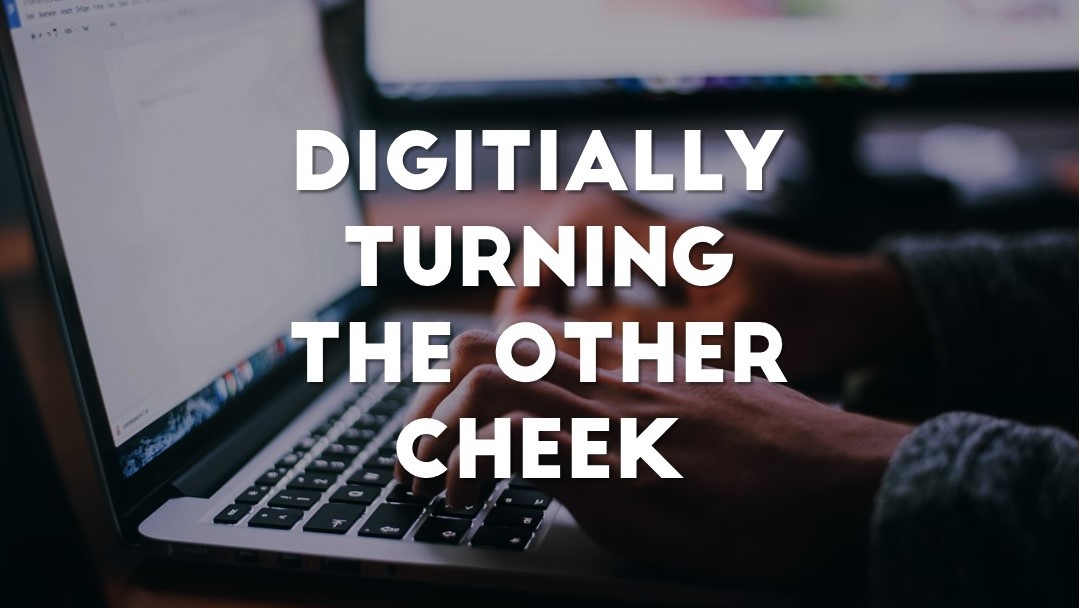This past Sunday we began a new teaching series called, “Bad Lip-Reading” in which we’re taking a look at some of the “hard” sayings of Jesus. Some of these sayings are hard to understand because of a 2,000 year and 6,500 mile culture gap. Some of the sayings are hard to understand correctly because we haven’t read them or heard them in their complete & proper context. In the case of this past Sunday, some phrases are just hard to live out. The phrase we attempted to unpack is found in Matthew 5:38-39, which boils down to “Turn the other cheek”. I won’t take the time to recap the message, but if you want to watch it, click here.
What I do want to do here is follow up our examination of this statement in a digital world, by answering the question, “How do I turn the other cheek digitally?”
The internet and all that it brings is amazing! We are SO connected! Nearly all the information you can imagine in the entire world fits right in your pocket! But as with almost anything in this world, everything that has a good side or that can be useful can also have drawbacks and can cause harm. This includes how we communicate and interact with others online. It can be a positive or a negative in our lives and in the lives of others. Unfortunately, there are times when people tag us in a negative post or comment on social media, they send us a personally negative or scathing e-mail, and even bully or harass us or someone close to us online. So, to answer the question at hand, how can we positively, productively, responsibly (and for Christ-followers, in a Christ-like way) respond to these and other similar situations?
Here are 3 things to consider…
1. THINK BEFORE YOU ACT
One of the few advantages to dealing with conflict on the internet is you are in no hurry to respond. Many interpersonal conflicts we encounter “in the flesh” seems to happen so fast. This is why we talked about the importance of non-retaliation during the message on turning the other cheek this past Sunday. But, when it’s online, you ALWAYS have time to pause and reflect before responding. ALWAYS! Here are 3 questions to ask yourself before posting, commenting, or responding online:
“Did I read that correctly?”
Read that e-mail again. Read that post again. Read that comment again. Did you mis-read something? Consider the context. Consider the source. Are you reading too much into something? Are you making assumptions that have caused you to become angry or upset? One of the worst things about any non-verbal communication is it’s difficult to distinguish a person’s tone. For people like me who have a dry sense of humor, this can be tricky. I may mean something as a light-hearted joke, but it may not always be received that way. For people like me who tend to be people-pleasers, someone may email me a simple, innocent, helpful suggestion that, if not careful, can be taken as a personal attack. Read, read, & re-read!
“Should I respond? If so, how?”
Is it worth your time and energy to respond at all to something negative online? Again, you ALWAYS have time in a digital setting before posting, commenting, or emailing. Use that time effectively. The stories became legendary about Abraham Lincoln dealing with conflict in this way. When he received hate mail or would have a heated back-and-forth with someone, he would write a long, detailed, nasty letter to them – and then burn it. Once that was out of his system, he would then write the letter that would actually be sent. If you consider your response first, there will be a lot fewer apology posts & emails to write later.
Really, the best response in any medium is a face-to-face follow-up. If that’s possible, your next post, message, comment, or email should be an invitation to talk things out in person. If distance is an issue, try to get their phone number (if you don’t have it) to have as personal of a conversation as possible. Whatever you do, DO NOT GET INVOLVED IN A BACK-AND-FORTH ON THE INTERNET!
“How will my response/post/comment/email affect me and the others around me?”
No man is an island. There are no internet islands, either. How we behave online does affect us, and it affects other people in our lives, too. If we’re quick to post, comment, or shoot a harsh email response, eventually we’ll lose respect & credibility of others. After too many digital mishaps, nothing you post will be taken seriously and your emails will go straight to the trash without even being read. Also, if there’s even a remote chance you’ll be looking to advance in your career or begin a new career, just assume your potential employer will look you up on social media. How do you want them to perceive you? But, our online behavior can have similar negative effects on our family & close circle of friends. They will get lumped in with us if we can’t learn to turn the other cheek online, and that’s not fair to them.
2. IF YOU WOULDN’T SAY IT, DON’T SEND IT
Don’t be an internet troll! (Go ahead and Google that term if you need to). Don’t hide behind your laptop and smartphone. Don’t get a false sense of courage just because you’re not forcing yourself to say what you feel like you need to say to someone’s face. BE A REAL MAN! BE A REAL WOMAN! BE A PERSON OF INTEGRITY! I think we all know the importance of our actions lining up with our words. Our online actions should line up with our words, too or it’s all over (see question #3 above).
3. IF YOU WOULD SAY IT (BUT SHOULDN’T), DON’T SEND IT
Sometimes in a live, person-to-person scenario, it can be difficult to think before we speak. We may from time to time say something quickly out of anger or frustration that we immediately regret and wish we could take back. But, I cannot stress this enough – with internet communication, there is ALWAYS time to avoid this! There is NEVER an excuse to post, share, tag someone, comment, or email something you’ll regret later! You’re not on a time clock. There’s not pressure to do anything or react to anything quickly. Use the time that’s available in an online setting to save yourself from yourself. You’ll thank me for it later.
—————————————–
I know this was a little lengthy, but I hope it was helpful for you. It may be difficult at times to “turn the other cheek” in your life and online, but it is possible. YOU CAN DO IT! You can help save the internet, instead of breaking it. Give it a shot, see how it works for you, and let me know how it goes @ stephen@firstcenturykc.com.

